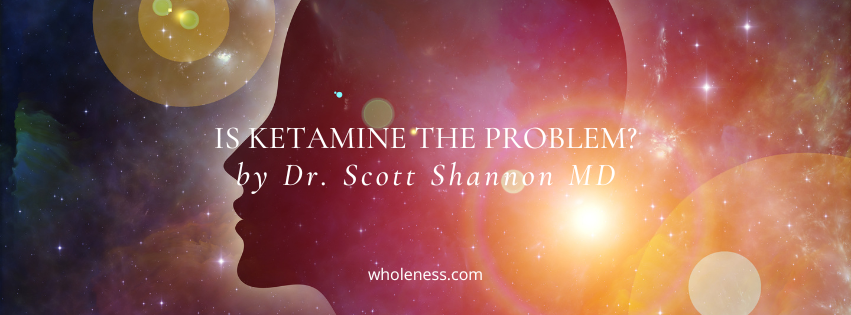
Is Ketamine the Problem?
Written by Dr. Scott Shannon, MD
Recently, ketamine has come into an uncomfortable spotlight. Between Matthew Perry’s untimely death and the FDA comments on the home use of compounded ketamine, this novel medication has come under fire. Where does ketamine belong in the psychedelic ecosphere? Does it even belong? Are we risking the values inherent in our psychedelic work for a lowly anesthetic agent?
Over the past ten years, we have witnessed an explosion of publications on psychedelics. The vast majority of the clinical studies employ a novel psychotherapeutic model, which can be called the psychedelic framework. The medications researched include a wide range of compounds such as psilocybin, 5-MeO-DMT, LSD, and MDMA. These medications share no common mechanism or biological pathway. Frankly, MDMA is not a psychedelic at all, nor is ketamine. The psychedelic framework is what ties this work together.
This psychotherapeutic model includes three basic components: container, catalyst, and carrier. The foundational element is the container of safety, rapport, and trust. Next, we have the catalyst: an agent to alter the flow of information and experience within the psyche. This could be nitrous oxide, as William James explored with curiosity in the late 1800s, or it could be holotropic breathwork, which Stan Grof pioneered and endorsed. Finally, we have the carrier. This is the use of support to drive the experience inward. Things like shamanic drumming, recorded music/headphones, eye shades, and a shared belief system that endorses the importance of the inner journey focus to power the shift in consciousness.
I have participated in or supervised over 7,000 ketamine sessions over the last 8 years. I have also been a Principal Investigator (PI) on studies with MDMA, LSD, and group ketamine. We are now researching 5-MeO-DMT as well as engaged with active clinical practice with psilocybin in a harm reduction model at our clinic in Colorado. Further, I actively surveil underground practice as part of my work. What I have learned from all of this is that some agents do not work for some people. All of these agents have strengths and weaknesses. Every agent can be used in an unhelpful or unhealthy manner. Some journeys can be transformational, but the real gold lies in the integration, not the journey.
Ketamine can be every bit as powerful and transformational as MDMA or psilocybin. It is not as durable as those two agents, but it alters the psyche well and can create plasticity and change where there was none previously. It is also legal and the central mode of practice for thousands of psychedelically oriented practitioners around the country who are spreading and exploring this model. Ketamine is a transitional molecule that is helping us move from the failed chemical imbalance theory of psychiatry to a new evocative model of the psyche.
The bottom line is that we, as a psychedelic community, should not villainize and dismiss some agents and glorify others. Rather, we need to protect the therapeutic framework and help others to see that it is not about the agent but rather the frame.
In Colorado, we now have a gold rush of excess and hyperbole following Prop 122. Law enforcement does not know how to respond and regulation is still forming. I have no doubt that unmitigated disasters will occur with psilocybin. This will most likely happen when the therapeutic container is compromised or absent. While I was involved with the first iteration of BPMT (Board of Psychedelic Medicine and Therapies), one thing that we all agreed on (and there was not much of that) was the need to pivot from an emphasis on MDMA and psilocybin to an emphasis on the psychedelic framework, which opens us to a wide range of agents and distances us from the inevitable train wrecks on the horizon with improper use of these catalysts. Matthew Perry and unscrupulous home use of ketamine are two examples of our current challenges and the message we need to deliver. The message that others need to hear explains what the psychedelic framework is all about. It is critical that we move past our differences and unite behind a coherent message.
Dr. Scott Shannon MD, is a true catalyst for progress and a founding member of the Psychedelic Research and Training Institute (PRATI). This visionary institute provides a platform to train professionals in ketamine-assisted psychotherapy and provide a deeper connection to self and nature. In 2021, Dr. Scott played a pivotal role in initiating the Board of Psychedelic Medicine and Therapies. His dedication to expanding access to psychedelic medicine inspired others to join the cause, and he served as the founding CEO for this non-profit public benefit corporation.
As a passionate advocate for transformative care, Dr. Scott has traversed the globe delivering lectures to professional groups. His paradigm-shifting perspective resonated deeply, opening minds and hearts to new possibilities in mental health. Dr. Scott’s journey has been marked by a relentless pursuit of tools for deeper healing that can catalyze real change in our mental health care system. This inspiration continues to drive his wide-ranging efforts.
Read more about Dr. Scott Shannon and his groundbreaking work.
At Wholeness Center, we partner with you to address your mental health concerns using ketamine-assisted psychotherapy as one tool to improve the relationship between your mind and body. You can live a balanced life from the inside out.
We provide a comprehensive assessment program and a dedicated team of professionals who will work with you to get to the root of your symptoms. You are not alone; we are here to guide you every step of the way. Please contact the Wholeness Center at 970.221.1106 to get started.

Leave a Reply